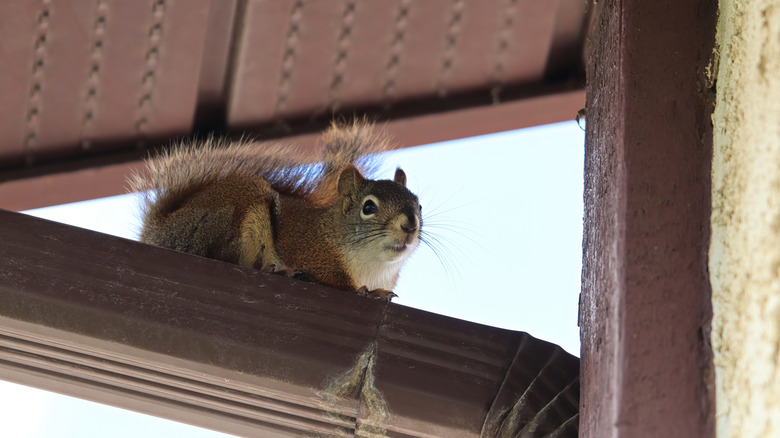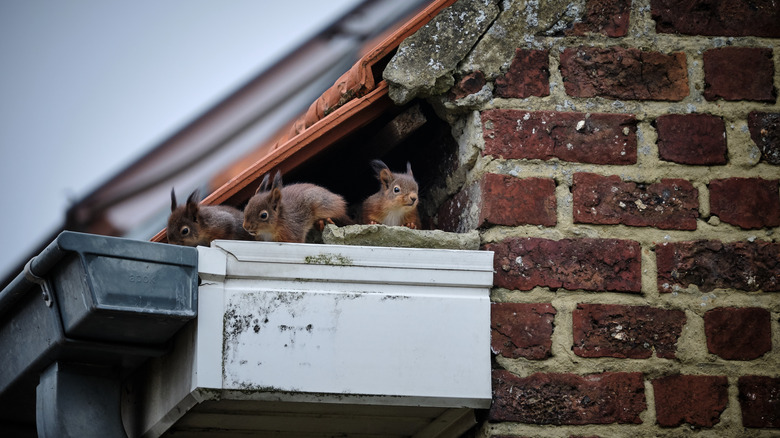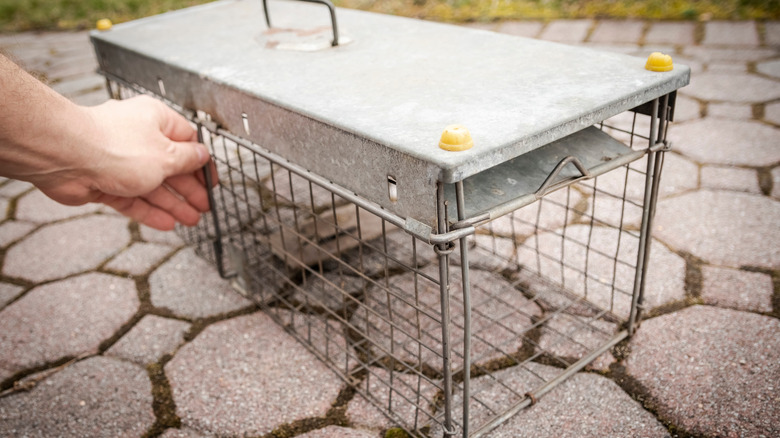Will Squirrels Eventually Leave Your Attic On Their Own? Here's What We Know
We may receive a commission on purchases made from links.
If you start hearing some small scratching noises coming from your attic, you may have a few new houseguests who have taken up residence. Attics can become prime real estate for squirrels, and once they've moved in, they won't leave on their own. Other pests, like raccoons, may wander in and out for the occasional shelter, but squirrels will actively seek out safe places to live and stay there, especially during the breeding seasons of early spring and fall. A female squirrel will often choose an attic to have her babies, meaning you could be dealing with a growing family rather than just some passing visitors. Even if food sources outside are plentiful, the warmth and safety of an attic make it too good for them to just abandon.
Another reason squirrels will stay is their nesting behavior. They'll tear up your insulation, cardboard, and even wiring to build their nests. This creates a perfectly comfortable environment that they have no incentive to leave. Since squirrels are creatures of habit, they'll continue using the same entry points to come and go. Waiting for them to leave on their own is not going to work and the longer they stay, the worse damage you'll have to deal with in your attic. Some people have found success by playing a radio in the attic to keep squirrels out, but that doesn't really work well for the long-term. The sooner you take action, the better chances you'll have of avoiding costly repairs.
How to tell if squirrels have moved into your attic
The most obvious sign of squirrels in your attic is the sounds of scurrying, scratching, or clawing noises. Squirrels are much like us and sleep during the night so you are much more likely to hear them moving around during the day. You may also hear persistent chewing as they work on the wood and wires in the attic. Another giveaway is to find their poop near entry points or nesting areas. You'll want to make sure you can properly identify pest droppings so you know what you're dealing with. Squirrel droppings are rounder and slightly larger than mouse droppings and are often found in piles.
Visual clues outside your home can also point to a squirrel infestation. Look for chew marks around roof vents or eaves where squirrels might be squeezing in. Torn-up insulation or any shredded materials around is a clear indication of nest-building. You might even be able to spot some actual squirrel tracks in dusty areas along the roof. In some cases, a musty odor will develop from urine-soaked insulation or hidden food caches. If you notice any of these signs, take action immediately. These squirrels will not leave on their own and the longer they stay, the more damage will be done.
Effective ways to remove squirrels from your attic
The most reliable way to get rid of squirrels from your attic is through exclusion techniques. Basically, letting them leave but preventing them from coming back. The easiest method is done by installing a one-way door over the main entry point, like this squirrel door excluder kit on Amazon. This is usually a special metal cage that opens up for them to exit, but blocks the entrance when they try to come back. Combine this with sealing all other entry points with heavy-duty materials like hardware cloth, and you should be squirrel-free in no time. Make sure to check the attic that there are no orphaned young, as they will die without a parent to take care of them.
For more persistent cases, live trapping may be necessary, but this requires careful handling. Place cage traps near the entry point and bait them with nuts or seeds. Relocation laws vary by area, so take some time to research your local wildlife regulations before releasing trapped squirrels. Never use poison, it's inhumane, can harm other animals, and risks leaving dead squirrels in places you may not be able to reach. To discourage any future guests, trim tree branches back from your roof, make sure you have secure trash lids, and consider installing squirrel-proof vent covers. If the problem seems overwhelming, hire a professional wildlife removal service and make sure that the job is done correctly and humanely.


